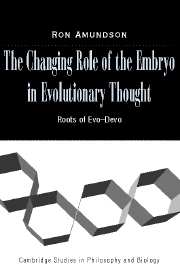1 - Introduction
Published online by Cambridge University Press: 05 June 2012
Summary
EVO–DEVO AS A NEW AND OLD SCIENCE
At the annual meeting of the Society for Integrative and Comparative Biology in January of the year 2000, a new Division was formed: the Division of Evolutionary Developmental Biology. This new organization would serve as a home for a lively field by the same name: evolutionary developmental biology, popularly known as evo–devo. In the minds of many of its practitioners (especially the more junior ones), evo–devo was new. It was a product of the explosive growth in knowledge about molecular developmental genetics during the 1990s. In a sense they were right; evo–devo really was new. Without the new molecular knowledge, evolutionary developmental biology would not have gathered the number of researchers or achieved the remarkable results that it could boast by the year 2000. Nevertheless, the subject is more than 150 years old. The conceptual connection between the development of an individual (ontogeny) and the evolution of a lineage (phylogeny) predates the 1859 publication of Darwin's Origin of Species. However, if evolutionary developmental biology is an old study, how could it be thought to be new in the year 2000?
The answer is that for most of the twentieth century only a minority of evolutionary biologists believed that ontogenetic development had any relevance at all to evolution. The Evolutionary Synthesis of the 1930s and 1940s established the mainstream of evolutionary biology (Mayr and Provine 1980). Population genetics was regarded as a causally adequate model of the evolutionary process.
- Type
- Chapter
- Information
- The Changing Role of the Embryo in Evolutionary ThoughtRoots of Evo-Devo, pp. 1 - 28Publisher: Cambridge University PressPrint publication year: 2005

